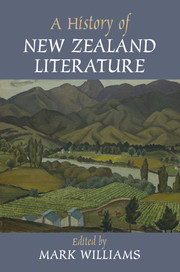Book contents
- Frontmatter
- Contents
- Notes on Contributors
- Acknowledgments
- Introduction
- PART I 1760–1920
- PART II 1920–1950
- 6 Colonial Ecologies: Guthrie-Smith's Tutira and Writing in the Settled Environment
- 7 Defiance and Melodrama: Fiction in the Period of National ‘Invention’, 1920–1950
- 8 Journalism and High Culture: Robin Hyde among the Cultural Nationalists
- 9 ‘Simply by Sailing in a New Direction’: The Poetics of Distance
- 10 ‘Rough Architects’: New Zealand Literature and Its Institutions from Phoenix to Landfall
- PART III 1950–1972
- PART IV 1972–1990
- PART V 1990–2014
- Index
8 - Journalism and High Culture: Robin Hyde among the Cultural Nationalists
from PART II - 1920–1950
Published online by Cambridge University Press: 05 April 2016
- Frontmatter
- Contents
- Notes on Contributors
- Acknowledgments
- Introduction
- PART I 1760–1920
- PART II 1920–1950
- 6 Colonial Ecologies: Guthrie-Smith's Tutira and Writing in the Settled Environment
- 7 Defiance and Melodrama: Fiction in the Period of National ‘Invention’, 1920–1950
- 8 Journalism and High Culture: Robin Hyde among the Cultural Nationalists
- 9 ‘Simply by Sailing in a New Direction’: The Poetics of Distance
- 10 ‘Rough Architects’: New Zealand Literature and Its Institutions from Phoenix to Landfall
- PART III 1950–1972
- PART IV 1972–1990
- PART V 1990–2014
- Index
Summary
Arraigning Journalism
In 1937, Denis Glover published a poem that came to symbolise the conflicts between the writers we now think of as the cultural nationalists and an earlier generation of authors. ‘The Arraignment of Paris’, Glover's satire on what he saw as the feminised nature of New Zealand literature and criticism, attacked a range of identifiable women writers and their patrons. One target was Iris Guiver Wilkinson (1906–39), the poet, novelist, and journalist better known by her pen name Robin Hyde, who would later commit suicide in London. Glover's lines on Hyde exploit her reputation for unpredictability and hint at some key biographical details, especially her fragile mental health, brought on in part by the birth of one stillborn son and another son whom she was forced to foster out, and her subsequent morphine addiction. Hyde was in fact a contemporary of Glover's, but also a writer with deep ties to the older critics and editors whom he wished to dismiss.
Among them, though, there's one who's fairly good,
a desolated star, a Robin Hood
who ranges round among the greenwood trees
from classic style to rabid journalese,
who turns her pen from sonnet or from ballad
to gossip pars, or recipes for salad.
A pity she should lack a sense of humour …
Glover had two favourite targets in his sights here – what his fellow cultural nationalist A. R. D. Fairburn called ‘the Menstrual School’ of poetry, and the press – but Hyde represented a particularly potent combination of the two. Her work had featured in Kowhai Gold, the 1930 anthology whose name became a byword for mawkish Georgianism in New Zealand poetry because of the apparently sentimental and derivative tone of the verse, but unlike her fellow contributor Fairburn, she did not appear to Glover to have turned away from the Kowhai Gold style. She was also, like many of her male contemporaries, a working journalist, but her journalistic output included work for sensational tabloids like the Truth and numerous stints as a contributor to the women's and children's pages of the press.
- Type
- Chapter
- Information
- A History of New Zealand Literature , pp. 112 - 124Publisher: Cambridge University PressPrint publication year: 2016
- 1
- Cited by



